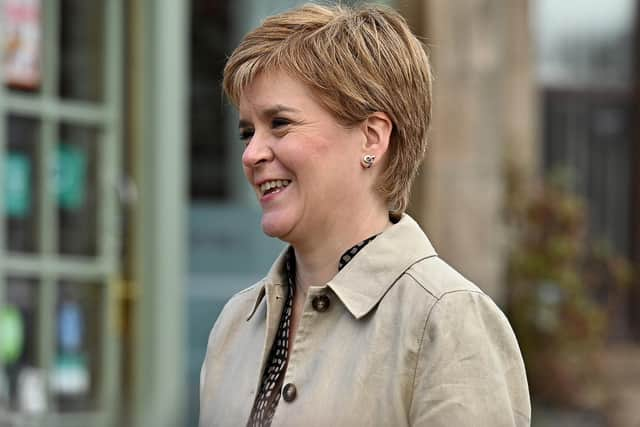Voters split on SNP record, but education, crime, and housing worst performers, poll shows
The four issues were the only ones with a net 'well' score below zero in the survey, meaning more voters thought they had been handled badly than those who thought they had been handled well.
However, voters were happy overall with the SNP’s record in government, according to the exclusive poll by Savanta ComRes for The Scotsman.
Advertisement
Hide AdAdvertisement
Hide AdA total of 1,001 Scottish adults aged 16 or over were interviewed between April 23 and 27 for the survey.


The poll also shows a clear gender split, with women overall rating the Scottish Government’s record in government positively across all policy areas, with men much more likely to view the First Minister’s record negatively.
Scots are also fundamentally split down party lines on Nicola Sturgeon’s overall performance in government, the poll shows.
Younger, female voters who are also more likely to vote SNP are more positive about the party’s record than older, male voters, who are also more likely to vote Conservative.


It provides an insight into where opposition political parties may focus their attention when battling for votes in the final few days of the Scottish Parliament’s election campaign and whether attacks on the SNP’s record in government will shift voters to back other parties.
The survey asked voters to rate whether the SNP had performed ‘well’ or ‘badly’ on various policy areas.
Ms Sturgeon’s record on education, crime, housing and managing Brexit were the only four policy areas which were more often viewed as being handled ‘badly’ versus ‘well’.
On education, the SNP was criticised heavily around the exam results fiasco in August last year where education secretary John Swinney was forced into an embarrassing U-turn after thousands of school pupils saw their grades unfairly downgraded by the Scottish Qualifications Authority (SQA).
Advertisement
Hide AdAdvertisement
Hide AdMr Swinney narrowly avoided defeat in a vote of no confidence on the issue after the Scottish Government struck a deal with the Scottish Greens to award all pupils with their original teacher estimated grades.
Opposition parties have also criticised the party’s failure to narrow the attainment gap and Ms Sturgeon asked voters to judge her performance as leader on her record on education.
A third of voters (34 per cent) believe the SNP has handled education well, with 39 per cent believing it was handled badly, giving the SNP a net rating of -5 – the worst of all policy areas.
Education was also the area worst rated by SNP voters in 2016 and the worst rated by Labour voters at -32.
The SNP was also judged to have performed poorly on crime (net ‘well’ rating of -4), Brexit (-3) and housing policy (-1).
The passage of the controversial Hate Crime Bill may have impacted the rating for the SNP on crime, with more than one in five (21 per cent) of those who voted Yes in the 2014 independence referendum stating that crime had been handled poorly.
On a similar vein, more than a quarter of Scottish ‘Remain’ voters (26 per cent) in the 2016 EU referendum said the SNP had handled managing Brexit poorly.
This could be due to the fact the SNP were vociferous in their opposition, but failed to force a second referendum on the issue despite campaigning hard.
Advertisement
Hide AdAdvertisement
Hide AdMore than half of Leave voters (53 per cent) said the SNP had managed it poorly, but it is likely these voters are also likely to be Conservative supporters.
In every other policy area aside from employment and welfare, which had a net ‘well’ rating of zero, the SNP were judged to have performed well overall.
All voters agreed the SNP have done well in advancing the cause of independence (+17), with voter judgement on health also positive on +12, likely helped by Ms Sturgeon’s handling of the Covid-19 pandemic.
The environment (+9), immigration (+7), transport (+6), defence and security (+4), improving family life (+3), tax and pensions (+2), and the economy (+1) were all judged to be overall positives for the SNP government.
Chris Hopkins, associate director at Savanta ComRes, said the judgement on the SNP’s record would be viewed as a “health success” for the party.
He said: “What feels striking here is that, of all policy areas, it’s advancing Scottish independence that the public feel the SNP have done the best on in their last five years in government.
"While the SNP, try as they might, put together a domestic agenda – which their supporters, incidentally, think has been excellent over the last parliament – it’s still driving forward independence that they’re seen as being the most successful on, while voters from other parties assess their record on almost all other policy areas poorly.
"Does this matter? While being seen to have a better record domestically certainly wouldn’t hinder the SNP and may have convinced a few more soft Labour voters to vote for them, ultimately driving forward independence is the SNP’s primary aim, and in that sense its recent record is seen to be a healthy success.”
Advertisement
Hide AdAdvertisement
Hide AdOf the opposition parties, Scottish Labour voters in 2016 were the most likely to split on whether the SNP had performed well or badly while in government.
SNP voters and Conservative voters were the most likely to praise and criticise the SNP’s respectively, with net approval ratings of +51 for SNP voters and -57 for Conservative voters.
While all policy areas apart from the environment (given a +2 net ‘well’ rating), Labour voters were consistently less likely to criticise the SNP’s record than Conservative voters with an average approval rating of -13.
Scottish Liberal Democrat voters were twice as likely to be negative about the SNP’s record than Labour voters with an average approval rating of -34.
Those who did not vote in 2016 – a group that includes anyone under the age of 20 and many foreign voters – were consistently positive about the SNP’s record.
Advancing the independence cause (+24), transport policy (+23) and health (+21) were given the best ratings, with an overall approval rating of +12.
Women were overall positive across all 14 policy areas with advancing independence (+24), health (+20) and transport (+18) viewed most positively.
The worst performers for the SNP were crime (+4), employment and welfare (+7) and Brexit (+7).
Advertisement
Hide AdAdvertisement
Hide AdMen were more likely to be negative about the SNP’s record, with education (-19), Brexit (-13) and crime (-12) the lowest rated.
However, advancing independence (+10), health (+3) and environment (+3) were rated as having been handled well overall.
A message from the Editor:
Thank you for reading this article. We're more reliant on your support than ever as the shift in consumer habits brought about by coronavirus impacts our advertisers.
If you haven't already, please consider supporting our trusted, fact-checked journalism by taking out a digital subscription.
Comments
Want to join the conversation? Please or to comment on this article.
